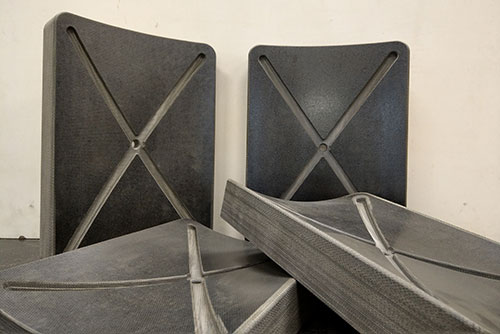Why Are My Hot Rolling Mill Bearings Wearing Out So Fast?
In the demanding world of steel production, the efficiency and reliability of your hot rolling mill are crucial. One component that plays a pivotal role in this process—but is often overlooked until it fails—is the composite bearing. If your hot rolling mill bearings are wearing out faster than expected, there’s a good chance that the problem lies deeper than just the material—they may be failing due to delamination, heat damage, or process misalignment.
Understanding the Role of Composite Bearings in Hot Rolling Mills
In hot rolling mills, U-shaped composite bearings and collars are used extensively to support the rollers on stands throughout the mill. These components are exposed to intense mechanical stress, high temperatures, water, and metal scale—all within an aggressive production environment.
The bearings we’re referring to are typically laminated thermoset composites that are compression molded. They’re designed for strength, wear resistance, and heat tolerance—but like any material, they have their limits and weak points if not manufactured or used correctly.
The #1 Failure Mode: Delamination
The most common issue we see with composite mill bearings is delamination—where the material begins to separate between its layers. Delamination significantly reduces the load-bearing capacity and integrity of the bearing, often resulting in rapid wear or catastrophic failure.
Why Does Delamination Happen?
- Dry Prepreg: This occurs when the composite laminate doesn’t contain enough resin to fully flow during the molding process. Resin is critical to binding the layers together. Inadequate resin content leads to weak spots, which eventually separate under load.
- Molding Process Errors:
- Incorrect Mold Temperature: Too hot, and the resin degrades. Too cold, and the resin doesn’t flow properly.
- Shortened Cooling Cycle: If a part is ejected too early from the mold, residual heat can create internal stress, leading to eventual breakdown.
“My Bearings Are Burning!” – What’s Really Happening?
If your composite bearings appear to be burning or charring, the issue is likely excessive heat. This can stem from several causes:
- Poor Water Pressure: Insufficient cooling at the roller leads to heat build-up.
- Misalignment: Improper alignment of the roller, stand, or bearing can create uneven loading and friction, increasing temperature.
- Heavy-Gauge Rolling: Running thicker or harder metals increases pressure and heat at the contact surfaces—accelerating wear and demanding more from the bearing.

How Franklin Fibre Bearings Outperform the Rest
At Franklin Fibre, we’ve spent decades perfecting the design and manufacture of thermoset composite bearings for steel mills. Here’s why our bearings last longer and perform better:
- Strict Prepreg Quality Control: We ensure every prepreg layer contains the proper resin content for uniform flow and structural integrity.
- Precision Molding: Our compression molding process is tightly controlled for temperature, pressure, and cooling—eliminating internal defects.
- Custom Engineering Support: We work hands-on with our steel mill customers to evaluate wear patterns, alignment, water systems, and load conditions to tailor the best solution.
Bearings shouldn’t be a consumable that constantly fails. If your mill is experiencing premature wear, delamination, or heat-related failure, Franklin Fibre can help identify the root cause and engineer a longer-lasting solution.
Our technical support and manufacturing expertise ensure that your bearings meet the toughest demands—so you can roll longer, stronger, and smarter.
Let’s troubleshoot your bearings before they become a production bottleneck.
Visit franklinfibre.com or contact our engineering team to schedule an evaluation.





